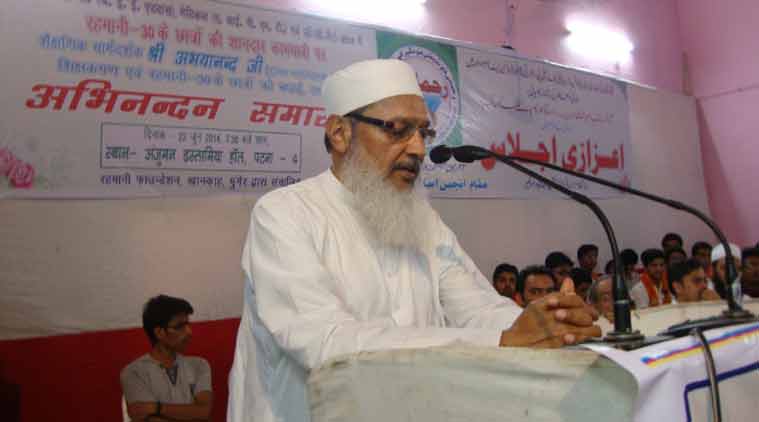Stay updated with the latest - Click here to follow us on Instagram
SC statement on UCC surprising as case in question not related to minorities: AIMPLB
The board works for the applicability of Muslim Personal Law in India and is against a Uniform Civil Code (UCC).
 Maulana Md Wali Rahmani
Maulana Md Wali RahmaniMaulana Mohammad Wali Rahmani is the General Secretary of All India Muslim Personal Law Board (AIMPLB). The board works for the applicability of Muslim Personal Law in India and is against a Uniform Civil Code (UCC). In an interview to The Indian Express, Rahmani tells Zeeshan Sheikh that if the code is forcibly implemented, Muslims would protest,
What is the AIMPLB’s stand on UCC?
We need to first see if UCC is required by our country or not. Our country is an amalgamation of different cultures and religions. If we try to bring in uniformity in religious matters, then the gains are few and the damage would be huge. The AIMPLB’s stand is that the system which worked for us, in which religions and cultures are allowed to flourish, should not be tampered. The UCC does not ensure equality, but disaffection in society. If you try to finish this multi-culturalism and homogenise everything, it will be harmful for the nation.
The directive principles laid down in the Constitution, however, talk about the state endeavouring to secure UCC across the country.
Such a thing is possible only when the hold of religion and culture on people breaks down and all religions get amalgamated. The Constitution does speak about the need to strive for UCC but Dr Ambedkar had said that only a mad government could think of implementing it. Based on Dr Ambedkar’s beliefs, I think that if the minds of the government and Supreme Court are not in the right place, only then should they tamper with personal law.
What the SC has stated on UCC is surprising because the case in which they made this statement was not related to minorities. It looks as if you are going down a particular street and decide to switch on the red light of the opposite street. At times even judges can make mistakes. To think that judges are learned is not the truth. They may be experts in law but their knowledge in these matters seems to be zero. They have claimed that marriage, divorce and inheritance are not related to religion. But they are related to religion where these things are decided by customs.
However, in the case of Muslims, these matters are directly related to the Quran which is the divine word. Those who are keen on UCC are failing to look at the complete picture of this country.
They do not understand the clout and hold of religion and culture on people. Just look at the outrage that has been generated over cow slaughter. There is no religious ordinance to stop cow slaughter. It is all cultural and this tradition is relatively new.
Even Gautam Buddha, when he attained Nirvana, is supposed to have slaughtered 70 calves. But today you speak about cow slaughter and see the outrage it generates. People are failing to look into how deeply we are affected by religion and traditions.
The UCC will affect all communities. However, there is a perception that Muslims are the main stumbling block for its implementation. Why is the AIMPLB so rigid about a uniform law?
We are ready to talk and hold discussions on this issue. The problem is that no one has approached us. AIMPLB has not uttered a word about UCC after the SC made a statement. However, we will protest if it is forcefully implemented. We are willing to talk and discuss on this issue. In a democracy, you need to converse. Moreover, the premise of our opposition to UCC is not so weak that we will be scared to negotiate on this subject. You also need to realise that it is not only Muslims who are opposed to such a move. Other communities including Sikhs have also spoken about the need for a separate personal law. The problem is that the media does not talk or write about them.
Islamic personal laws have been amended in Muslim countries like Pakistan, Indonesia, Turkey and Bangladesh. Why can’t it happen in India?
Are we supposed to ape Pakistan and Bangladesh now. We will use our own mind. In Egypt, a small court decided to hang 800 people.
In Bangladesh, the courts are hounding Jamaat-e-Islami leaders. You think we should ape them? Indian Ulema is capable on matters of religion and we do not need to follow anyone.
Almost half the Muslim population, which is women, seems to be getting the wrong end of the stick when it comes to religious laws. Why are we not codifying personal laws to eliminate practices like triple talaq?
We have codified personal laws. However, if by codifying you mean making changes, then that is something we cannot do. All the women’s groups which speak about the need for codification have no experience of drafting legislations. AIMPLB has codified all personal laws, but if by codification you are seeking amendments, then that is not possible. We cannot change divine laws. Our laws are not based on tradition or culture, but on Quran and Hadees.
Are you supporting oral triple talaq? Many say this system has no religious sanction.
Those who say do so due to lack of knowledge. I do not feel there is a need to change any personal laws. There is a Section 302 in IPC. Has that brought down the number of murders? Changing laws does not help; you need to change the mindset of people.
Our Constitution also speaks about the need for prohibition. Morarji tried to do it and consumption of alcohol ended up increasing. The requirement is social change and not change in laws. I believe that triple talaq is the not the right way to go about. It is the most disliked thing that are permissible in Islam. However, we cannot close our eyes and say that it has no place in our religion. It does and we will have to live with it. If someone gives triple talaq, then it will be applicable.
What does AIMPLB plan to do to tackle growing extremism amongst Muslims?
The AIMPLB is not doing anything because it is not related to the purpose for which it was set up. However, at a personal level I would like to say that it needs to be condemned and tackled. A movement needs to rise to tackle this. But you also need to look at people who have been framed by the state in terror cases. You have people who have seen their lives being ruined. How will they get compensated? There needs to be a degree of fairness in the system. I say that the first person who started this trend of explosions was George Fernandes who planted gelatine sticks on railway tracks and places in Bihar where MLAs stayed. You have a situation where such men are made cabinet ministers, while another set of people are hanged for their presumed guilt.







